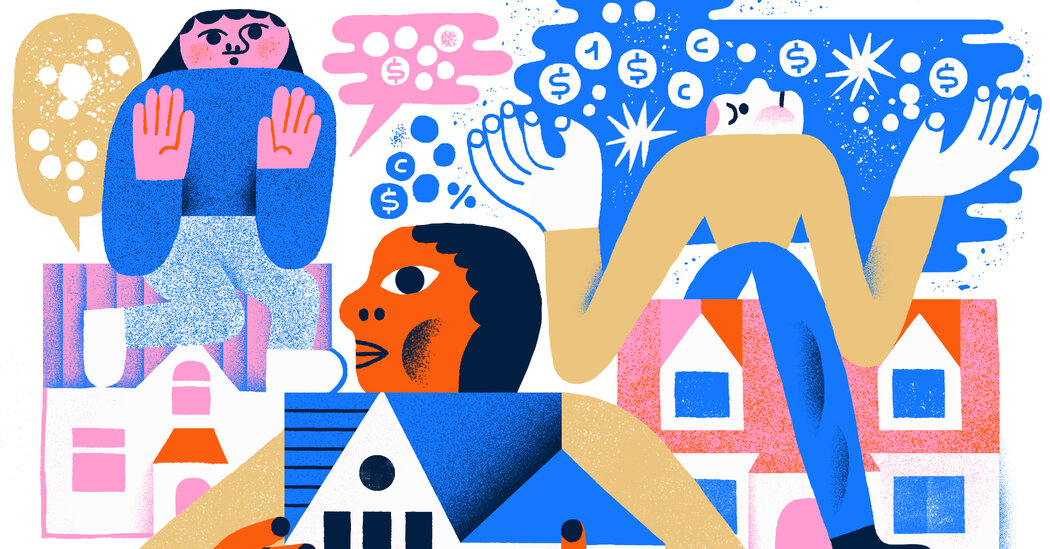
Ronda Kaysen recently wrote about a kind of one-upmanship born out of the pandemic: gloating over mortgage rates.
Times Insider explains who we are and what we do and delivers behind-the-scenes insights into how our journalism comes together.
In July, Ronda Kaysen, a Real Estate reporter for The New York Times, put out a call to readers. She wanted to learn how homeowners and prospective buyers felt about their mortgage rates.
During the early months of the coronavirus pandemic, the Federal Reserve slashed interest rates to bolster the economy. The action sent mortgage rates to an all-time low, which spurred people to buy homes. This drove up home prices, and, as the Federal Reserve has raced to bring inflation under control, mortgage rates have surged. Ms. Kaysen became curious about those who were lucky enough to purchase homes or refinance during the pandemic — and those who missed out.
Within an hour of her posting the call, responses flooded her inbox. “When I contacted people, they were usually on one of two sides: those who bragged about how great their rate was or those who were angry they didn’t buy a home,” she said in an interview.
For an article that appeared in last Sunday’s newspaper, Ms. Kaysen corresponded with 35 homeowners across the United States. She heard both success stories and tales of envy and regret.
Here, she shares her thoughts on inequality amid a frenzied housing market and the challenges of discussing money with strangers. This interview has been edited.
Why do people love to brag about a good interest rate?
It depends on the person. The thing is, getting a good interest rate is usually all about luck. During the pandemic, people who were in good financial shape reaped the benefits of a low, 2.5 percent interest rate. But most of the people I spoke with who didn’t buy a home during that time had a reason: They were pregnant, out of work or didn’t have savings, so they missed this historic moment to buy a home. Underneath it all, my article is actually about economic inequality.
Were people willing to share actual numbers and their interest rates?
Yes, but I’ve found that Americans generally don’t like talking about money. People like to talk about beating out 20 bidders to buy a home and getting a good interest rate instead; it’s a way to brag about money and financial prowess without disclosing how much money they earn or the cost of a home.
In general, do you find it challenging to find sources willing to discuss their finances?
People are usually pretty open. But there are people who will say they don’t feel comfortable and are more bristly about discussing their finances.
Many people also have help from family and are uncomfortable talking about it. Sometimes, the math doesn’t add up — like the cliché about the yoga instructor who has a $1.5 million condo in New York City, for example. I’ve always tried to address that in my coverage by asking for specifics, like their profession or how much their house cost.
Several years ago, I wrote an article about first-time home buyers and how they afforded their homes. It was tough to report because some people were unwilling to go on the record about, say, having received an inheritance. Those kinds of stories are really helpful because they demystify the home-buying process. It would be enlightening if people were more forthcoming about the process.
This makes me think of salary transparency.
Right. I feel embarrassed about that, too. What if I found out a less experienced colleague makes more than I do? I think there’s a lot of shame in money and how we talk about it. But if we talked about it, we might come to understand that one person’s struggle isn’t a sign of poor financial decisions but instead circumstances that may be beyond their control, like access to family wealth.
People don’t generally talk about their practical strategies, like the amount of money they put away in savings every year. This same conversation applies to paying for college: Parents do not discuss how they’re saving for their kids’ college or paying for it, which adds to the opacity.
You recently wrote about how modern farmhouses are taking over the United States. What’s next?
I think there’s going to be something we maybe haven’t seen. House design trends are a lot slower than fashion because homes take lot of time to build. In this moment, I do think we’re seeing an evolution from the farmhouse into a more natural aesthetic, with plants, wood materials, greenery and earthy tones.
Do friends and family approach you with questions about home buying?
Yes, I get asked questions all the time. People will ask me, When is a good time to buy a home? Or, What will happen to home prices, and will they crash? I’m not an economist, so I can’t answer those questions, and I’m not sure an economist can, either.
Friends also ask me to come along with them to visit homes. I’m conservative when it comes to real estate. When viewing a house, I’m always wondering, what’s the boiler like? How’s the roof? What are the windows like? I tally all those assets because those things cost a lot of money. You just can’t be persuaded by cabinets.
This post was originally published on this site be sure to check out more of their content.









